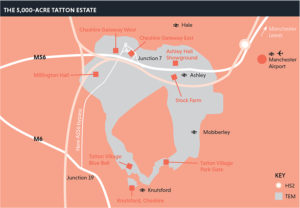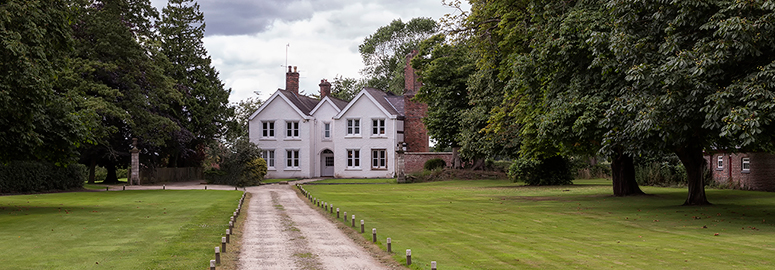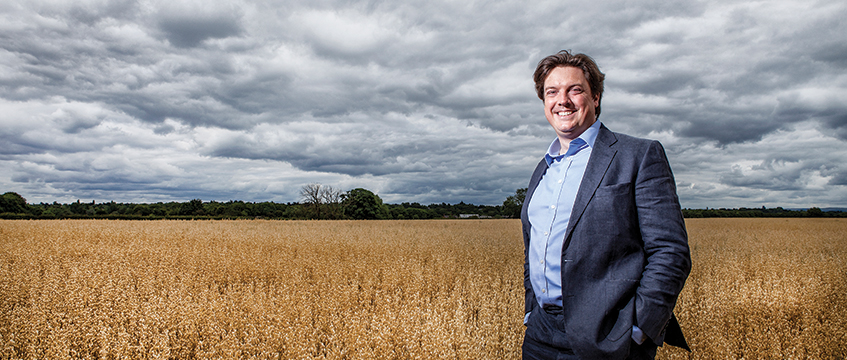Today, you don’t need to be an aristocrat to own a sprawling British estate. But without a stately-sized fortune, you do need to diversify in order to survive. Henry Brooks, the affable 36-year-old son of the owner of the 5,000-acre Tatton Estate in east Cheshire, is doing just that.
The estate has recently been used to film BBC television series Peaky Blinders, it hosted a group of Amazon’s software programmers from Slovakia to set up the IT systems at its nearby 700,000 sq ft warehouse, and boasts OKA (the interior design company co-founded by Samantha Cameron’s mother Lady Astor) and Californian electric supercar maker Tesla among its retail tenants.
Brooks, known locally as “HB”, is now envisioning a Soho Farmhouse-inspired holiday short lets business, a wedding and conference events subsidiary, and has ambitious plans to expand his property advisory firm, which specialises in leasing, planning and utilities. Situated in one of the most prosperous areas of the North West, on the doorstep of George Osborne’s former Tatton constituency, the largest privately owned freehold estate in east Cheshire could also present major partnership development opportunities.
Diversification and preservation
The Brooks family has owned the estate since the death of the last Lord Egerton in 1958 (see below). Henry Brooks set up Tatton Estate Management in 2013 to offer property, planning and utilities advisory services, in addition to running events, film locations and holiday rentals. TEM, which employs 12 people, does not own any assets, but acts for the estate on some projects and advises external clients.
Brooks says he didn’t always plan on working on the estate. “I studied at the European Business School in London and thought I would work abroad because it would be more exciting,” he says while driving along a country lane at the wheel of his TD5 Land Rover. However, after working in industrial administration and control at Italian tyre manufacturer Pirelli and as an executive at equities broker Macquarie Securities, where he focused on infrastructure, he realised the most interesting opportunities were closer to home.
“The lightbulb moment came to me that the Northern Powerhouse is real and happening here,” he says.
Preserving the estate, in the spirit of his grandfather’s initial acquisition, is central to Brooks’ ambitions. Today, that means maximising rental income and community uses.
“It’s about finding innovative new uses which reflect what people want and need,” Brooks says. “So Ashley Hall [used for the set of Peaky Blinders] is a really good example of turning something which is agricultural – we’re still farming the land ourselves – but using the buildings as film studios, renting to an events business and beginning to direct events ourselves.”
The estate has a portfolio of four Airbnb properties with plans to convert more homes into a “Tatton collection” of short-let rental properties as they become available. Brooks says he enquired about Soho House opening a members’ club on the estate but was told it was not presently looking to expand in the UK. “We’ll just have to do it ourselves,” he says, outlining a vision where guests will be driven between different properties so they can have a varied experience. Tatton hosted its first wedding last month after converting a barn into a sound-proofed events space which can cater for 120-160 guests.
Development opportunities
While the day-to-day running of the estate is carried out by Fisher German, there is plenty for TEM to get stuck into closer to home. The advisory business now offers property and asset management, utilities, planning, acquisitions, lettings and sales services on commercial and residential properties in both urban and rural locations. The estate, which is almost entirely green belt, could be the source of some prime development opportunities if Cheshire East Council agrees to release some of the land. Land values in Cheshire are among the highest in the country, with average house prices at £239,000, according to Zoopla.
TEM has received outline planning consent to build 200 homes on a greenfield site at Park Gate in Knutsford. However, it thinks there is potential for a larger mixed-use garden village. TEM is looking to potentially acquire the site from the estate with a partner to develop directly. Brooks believes it is an opportunity for pension funds, private rented-sector developers or retirement living operators “with a track record or ambition of raising the bar.”

Some 70,000 sq ft of brownfield land is also immediately available for development across two sites on Cheshire Gateway West and Cheshire Gateway East (see map, above).
TEM says the 180-acre “gateway” area, which is appropriate for sectors such as science, distribution, advanced manufacturing and science, research and development, represents a major strategic development opportunity in the longer term. Designated green belt, the area includes multiple brownfield sites and is partly occupied by the A556 site compound.
Brooks guffaws at the idea of ever selling any land freehold, but doesn’t rule it out entirely. “We would look at a long leasehold or partner up to build out a development,” he says. “We want to get more involved in direct delivery so we are looking at some innovative structures where we could do things really on a partnership basis.
“We don’t want to have a big capital receipt upfront, so we can reduce the amount of working capital needed for a development and so that makes a lot of projects viable that might not have been. But then they know we’ll ideally stay in for the long term and we’ll be involved, so the partner they get involved with is the partner who will be managing it afterwards and bring in other occupiers.”
Improving infrastructure
Although the council has recognised that there needs to be more green belt release, Brooks thinks “it doesn’t go anywhere near far enough”. He says: “Part of the problem is there aren’t good mechanisms for public and private sector to work together to deliver real quality development. So, with our consents in Knutsford, we’re really trying to do something special and deliver mixed-use, high quality architecture – sustainable places, rather than just housing estates or industrial estates.”
The estate is within an hour’s reach of 7m people. The area, most famous for being the favoured place of residence of professional footballers, also has one of the most productive labour forces in the country. In 2015, its GVA per capita was £31,000 per head – 18.7% above the UK average.
The Local Enterprise Partnership, Cheshire & Warrington, thinks it could be a £50bn economy by 2040 partly driven by a new HS2 station at Manchester Airport, just 13 miles from Knutsford. It is home to major science and advanced manufacturing development, including the 400-acre life sciences hub project at Manchester Science Partnership’s Alderley Park, part of the Cheshire Science Corridor Enterprise Zone. Brooks has identified development opportunities on the estate for science, research and development, advanced manufacturing, and hotel and conferencing facilities (see map).
Brooks says: “I think it is recognised more than ever that we have a desperate housing crisis, but in this area we have a really acute employment land shortage, whether that’s land in terms of much-needed logistics or science parks, or whether it’s more subtle, for little local occupiers, advanced manufacturing, for pubs or local shops.”
For development to be brought forward, infrastructure improvements are vital, and Brooks is a vocal campaigner for investment and more joined-up thinking between authorities. The £200m A556 road linking Cheshire to Manchester Airport opened in March, but Brooks points out that not a single long-term job or home has been delivered on the back of it – despite being just 10 miles from Manchester.

Picture: Paul Warpole
He hopes that Transport for the North, which is due to receive statutory powers later this year, will enable infrastructure across cities in the North of England to be planned sustainably, rather than piecemeal by local authorities.
He stops outside one neglected looking train station right on the boundary of Greater Manchester and the estate. “The infrastructure we have is terrible, he says. We have no boards, no ticket office, no staff and no car parking.”
While preserving the family’s estate is at the heart of his activities, Brooks’s ambitions for TEM go far wider. He thinks the property industry is “widely misunderstood” and wants to help promote public understanding about the value landowners can offer communities. All that while doing what he can to promote the Northern Powerhouse.
Estate history
When the last Lord Egerton died in 1957, Tatton Hall and park were separated and gifted to the National Trust. The estate’s executors were looking for someone to buy and preserve the remaining 5,000 acres. The land was acquired by Henry Brooks’s grandfather, Harry from Levensulme, Greater Manchester, who founded a successful business that made furniture available on credit. The freehold estate, which comprises around 500 residential and commercial properties, is now owned by his son, Randle Brooks (Henry’s father), who is senior trustee.
Business benefits
Diversification was partly motivated by a desire to avoid the 40% inheritance tax rate, which owners of landed estates can minimise if they can prove that they are “wholly or mainly” a trading business. Known as the “Balfour model” after a 2010 case between HM Revenue & Customs and the representative of the late Fourth Earl of Balfour, the rule allows estates where more than 50% of activity is trading business to qualify for business property relief.
“It’s the first time ever that the tax man has done us a favour,” says Brooks. “Because they’re encouraging us to do something which otherwise we wouldn’t have done – and actually, it’s a really great business, profitable and enjoyable. And one of the nice things about it is when you are directly involved in the economy, people begin to see the impact that the estate has in terms of job creation, local spend, purchasing through suppliers and letting activity, and so we enjoy that.”
To send feedback, e-mail Louisa.Clarence-Smith@egi.co.uk or tweet @LouisaClarence or @estatesgazette











